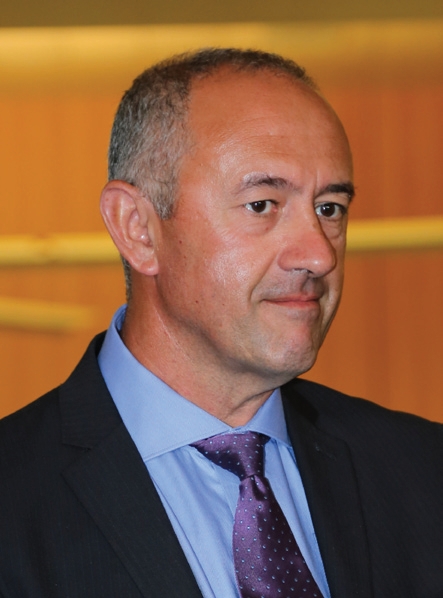18 July 2017
Interview with... Albano Coutinho - CEO NAV Portugal
CEO NAV Portugal
[Cleared n°6 - year XIV - june 2017]
CEO NAV Portugal
[Cleared n°6 - year XIV - june 2017]

Portugal for its geographic position ensures the ATM interface between the aviation regions (FIR) of the Atlantic, Europe and Africa. What is NAV Portugal's role in relation to the entire network.
Portugal is in fact in a very important position in relation to the network due to its unique geographical location. The two FIRs under our responsibility, Lisbon (Continental) and Santa Maria (Oceanic), seen as a whole airspace, are bigger than the sum of the area of the 28 EU member states’ territory, and we are the only ANSP that connects SESAR to NEXTGEN. Due to our location, we have boundaries with EUR, NAT, SAM and AFI ICAO Regions, and our ACCs have direct coordination with Madrid, Casablanca, Canárias, Sal, Piarco, New York, Gander and Shanwick. That puts us in a kind of crossroads between Regions, which means that we have to make sure that our customers receive a seamless service in the transition between different regions and types of airspace.
What are the most important international initiatives and projects where NAV Portugal is committed to European level?
At European level, the Deployment of SESAR is the key challenge to any ANSP in Europe today, in line with ICAO’s ASBU programme. The level of detail differs from country to country, but for NAV Portugal, the introduction of a new ATM System in Lisbon ACC will be a key element in this process. We are looking at collaboration between ANSP’s in the area of ATM system deployment and development as the best solution for success.
What are your most proud results?
Definitively the fact that NAV Portugal was the first ANSP to implement the Free Route Airspace Concept in Lisbon FIR (above FL245) back in 2009. The excellent collaboration environment between NAV Portugal and the Portuguese Air Force, which has always been the standard in our country, was a major enabler to this successful project, obviously supported by the know-how and experience of our ATCOs and technical staff.
Recently, his country along with others has seen an increase in air traffic, how does the phenomenon explain?
This large increase in traffic figures that we’ve experienced, especially in the last couple of years, is a result of several factors, the main and more obvious being the shift in the tourist flows from the areas of the Eastern Mediterranean to the Southwest (Portugal and Spain, including the Canary Islands, Madeira and the Azores), along with an increase in the traffic to North, Central and South America. It is clear that the international situation and the recent terrorist attacks are playing an important role in these shifts. Also, the evolution of the Low Cost Airlines is playing an important role in this large increase of traffic, with constant opening of new routes to and from major airports but also, to a large extent, to and from smaller airports.
If there are, what are the main operational differences between an ANSP of central Europe and one border as NAV Portugal?
For us, NAV Portugal, the main difference is that it makes us interact with more countries, but mainly Regions. And with coordination being a key operational component, it has been giving us the opportunity to interact and cooperate with all our “neighbours” and participate in numerous international projects related to regional and inter-regional coordination. Because of our operations in the NAT Region (Santa Maria ACC), being part of the ICAO North Atlantic Systems Planning Group and its sub-groups from the early days has given us the opportunity to participate and gain from the evolution of some of the major and pioneering advances in the ATM industry.
What are the operational and technological priorities in the aeronautical field that must be put into effect for the future at national and international level.
Our main priority today is the introduction of a new ATM system in our Lisbon ACC, which will allow us to cope with the increasing traffic demand in Lisbon FIR, by allowing us to deploy the main SESAR derived features into our operations, thus providing our main asset, our people, with the tools they need to continue to evolve and to continue to provide the safe air navigation services that they have always been very proud of. Along with that, and at international level, cybersecurity is definitely the main priority for any country/ANSP, as new and digitalized systems are introduced and as much as ATM goes online. It is, in my view, a major challenge, if we think that, looking at other industries that have been dealing with this threat for a long time, and yet you keep seeing cases where the evil minds manage to find a way into some of the safest and most secure systems. If we keep having to catch up with these perpetrators we’ll never be able to guarantee the integrity of our services. That’s the big challenge we’re all facing.



